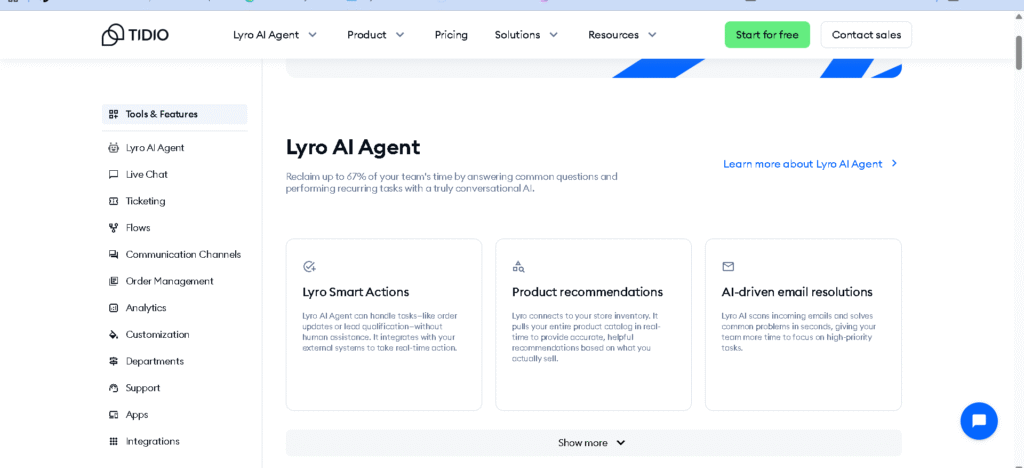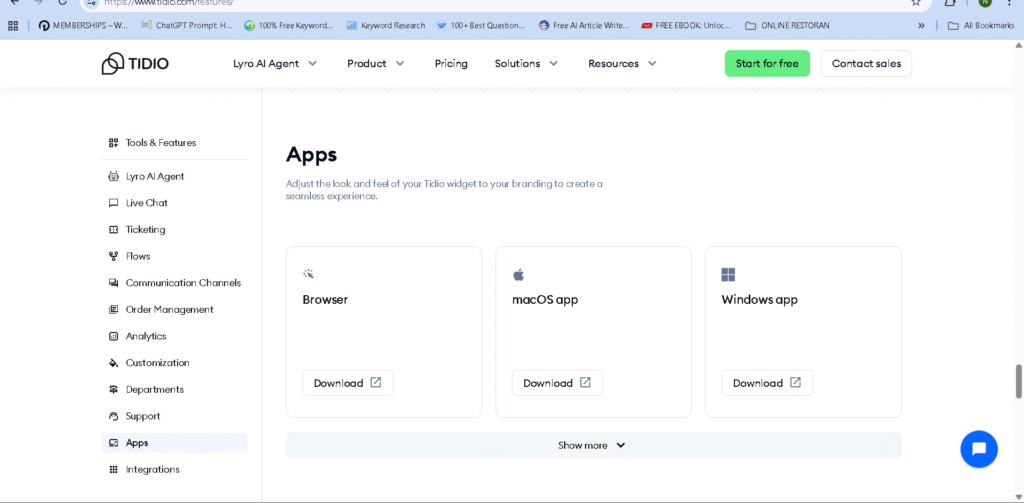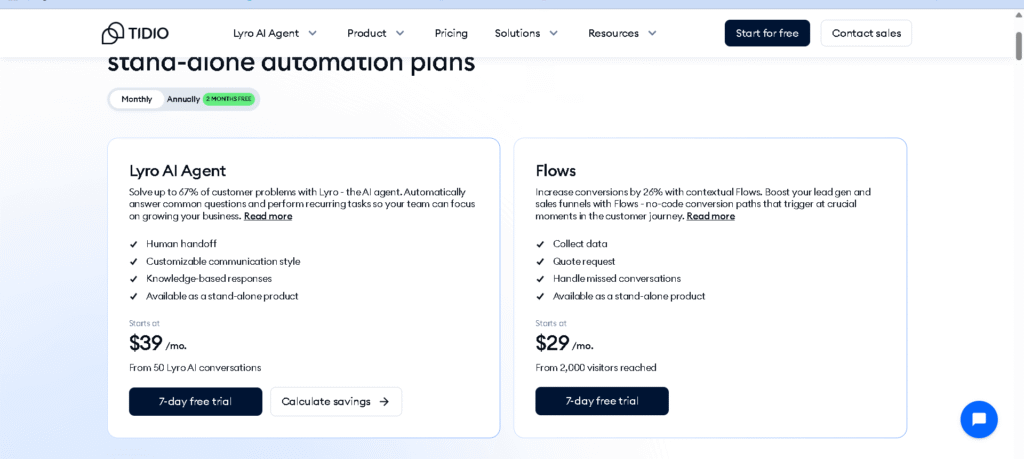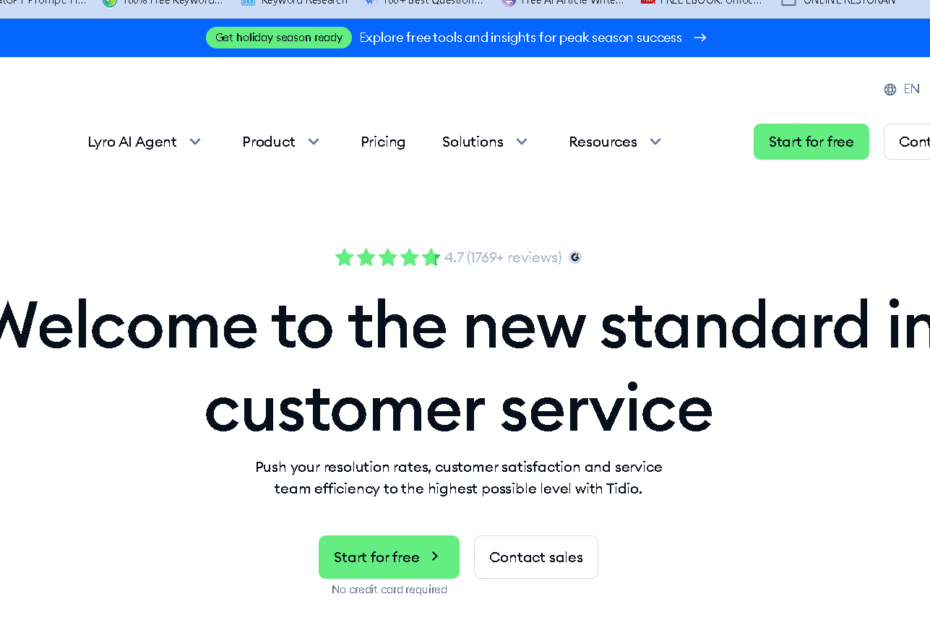Tidio AI is a customer service platform that features smart chatbots and live chat tools that automate businesses’ repetitive support questions quickly and conveniently. The system has AI agents and real human support to help support teams manage live and automated chats, emails, and social messages from a single console. It has artificial intelligence Lyro which is capable of answering up to 67% of recurring customer queries, thus, improving resolution rates, and reducing the time spent by the support team on similar questions.
The tool is compatible with other existing tools for easy integration or it can be used as a full-fledged customer service suite for agents. The combination of automation and human support for streamlined communication helps in improving customer satisfaction rates and customer service efficiency without fully replacing human support. Support teams and businesses have reported greater customer engagement and speedier support issues resolution with the system.
Users can integrate the AI tools into existing chat systems or explore its full capabilities as a complete customer service tool for their business without starting from scratch. The solution also has seamless and simple integrations with over 120 tools. This and its other customizable features make it suitable for various business types and needs.
Table of Contents
- What Is Tidio AI?
- Overview of Tidio and Its AI Capabilities
- Evolution of Tidio as a Customer Support Platform
- Core Use Cases for Businesses
What Is Tidio AI?
Tidio AI is a suite of intelligent tools and features designed to enhance customer service communication and automate certain tasks that a support team would typically handle. It uses artificial intelligence to automate customers’ questions, help support agents work faster, and increase the effectiveness of sales operations. The system has AI chatbots and offers various AI-enabled features that can be customized to meet business needs. Small and medium businesses are one of the main target markets of the system.
Overview of Tidio ai and Its AI Capabilities
Tidio is a customer support platform with AI chatbots that are capable of supporting clients on their websites with pre-programmed questions as well as a human team of agents ready to take over once necessary. The system uses natural language processing in the form of AI chatbots to make sense of customer messages. This capability helps the chatbots to process and understand customer queries, provide appropriate responses, and redirect difficult issues to human support. The platform’s AI also uses past conversations to learn and improve for future responses.
The major AI features include the AI Phrase Matcher which compares new customer messages to previously input responses. The system will recognize questions with similar intent and offer a similar pre-loaded response even with spelling mistakes. Another feature is the FAQ Wizard, which automatically generates bots from FAQ pages. Customers can then chat with the FAQ bot and ask any of their queries. The FAQ bot answers the queries with pre-loaded answers from the FAQ page.
Tidio AI can support multiple languages but would require the setting up of a different bot for each language. The system’s overall design supports an AI tool for repetitive and simple tasks automation. The design does not completely take over the personal human touch in the agent and customer interactions.
Evolution of Tidio ai as a Customer Support Platform
Tidio began as a basic live chat plugin that connected customers to agents and enabled agents to communicate with visitors in real-time on websites. There was the addition of AI to the support system, which was a step in automation to respond to customers’ demand for scalability and conversational automation. In its early phases, Tidio offered live chats, with manual replies to customer messages.
After integrating AI, the platform’s capability to connect with customers was broadened with the introduction of AI-powered chatbots for automated customer support. In a step toward a fully hybrid setup, where the AI tools are used to support and not take over from the agents, the system introduced support assistants that help the human agents do their jobs easier. These include features such as the Reply Assistant, which has AI-powered editing tools that make suggestions that help to improve messages to match the company’s voice and tone.
Other enhancements include tools that help the human agents to sort out incoming chats by reprioritizing tickets based on urgency, and Smart Views, which can detect when and the reason for message spikes to help agents assign priority. With its hybrid approach, Tidio AI makes a business’ support system more efficient during instances of high ticket intake while not replacing the human agents.
Core Use Cases for Businesses
Tidio’s AI-enabled tools are mostly deployed by e-commerce and online businesses in the area of customer support and communication. They use them for automating responses to customers on frequently asked questions or questions that the business has the answers to and may recur from time to time. Examples of such questions include but are not limited to order tracking, order returns, order refunds, frequently asked questions on website pages, etc.
With its AI-based tools, businesses can:
Automate frequently asked questions with AI assistance to reduce time
Prioritize which messages to sort and reprioritize with intent recognition
Improve agent replies and suggest improvements with AI-powered writing tools
Support multiple languages but would need to have different bots set up for each supported language
Automating simple questions and reprioritizing which issues to sort allows the team to focus on more complicated issues and in turn, providing better customer support experiences.
InsertChat Review: Build Chatbots for 24/7 Engagement!
Key Features of Tidio AI

AI Chatbots and Customer Support in Tidio ai
Tidio AI is a business support tool aimed at improving customer support operations and efficiency. Key features include live chat, automated messaging and responses, and the ability to route and manage inquiries from a centralized dashboard. These features help businesses respond to more customer chats with a personal touch.
Live Chat Features
Tidio AI comes with a live chat feature that enables businesses to engage and respond to visitors on their websites. Plans provide support for up to 50 simultaneous conversations per month on entry-level packages, allowing small to medium-sized enterprises to use the service.
The live chat feature can be used to answer customers’ frequently asked questions in real time or to walk customers through their purchasing journey. Customers can engage with the service using several communication channels. Tidio also has integrations for social media which helps users to centralize communications from different networks in one place.
The user interface is intuitive so support agents and teams can manage more chats. It also provides for real time notifications and typing indicators. These features allow for prompt communication between the business and customers with clear messaging.
Chatbots for Automation and Efficiency
AI-driven chatbots in Tidio AI can automatically resolve up to 90% of customer inquiries without the need for human agents. These bots are capable of understanding natural language through the AI Phrase Matcher. This lets chatbots recognize different customer queries even if phrased or worded differently.
Chatbots can also search for information from FAQ pages with the help of FAQ Wizard to provide answers without a long setup time. The bots learn from previous interactions and improve over time. They are also designed to independently manage common topics like order tracking, refunds, and shipping.
Automation means less work for agents and quick replies to customers around the clock which helps improve customer satisfaction and can potentially boost sales.
Help Desk Features and Tools
Tidio AI also has a series of help desk features that can help business to organize, streamline and prioritize support activities. It has ticketing feature that tracks and manages requests that need human intervention.
The suite also has various tools that include Reply Assistant to assist agents in composing professional and consistent support messages. It also has an automated feature called Customer Intent that automatically sorts conversations into topics. This helps teams to prioritize conversations that need more attention.
Smart Views is another tool that sorts incoming messages by priority and/or topic. It allows agents to respond to high priority questions first. These help desk features are aimed at improving the productivity of support teams and ensuring more critical support matters are attended to as soon as possible.
Improving Customer Support
Tidio AI provides businesses with the ability to solve common challenges around customer support that they may be facing. For instance, they can leverage Tidio to reduce response times, create personalized customer interactions, and boost satisfaction rates.
This can be done through automation, use of AI, and smart technology to handle common and repeatable requests. This allows human agents to focus on more complex customer needs.
Faster Customer Support Response Times
The AI agent in Tidio is designed to instantaneously acknowledge customer inquiries, thereby reducing wait time from several minutes to a few seconds. It can also provide automated responses to common questions as well as process orders and provide information on demand 24/7.
Customers are always guaranteed to get quick replies anytime of the day. There is no need to wait for support teams to come online or long hold times on customer support channels. The AI agent also sorts customer inquiries to prioritize urgent cases for quicker response.
Automation of Tidio handles up to 67% of routine customer inquiries automatically. This means less support cases for human agents to attend to resulting in faster response rates to inquiries, as well as fewer delayed responses, for a more efficient and lean customer support operation.
Personalized Customer Interactions
Tidio AI also learns from each customer interaction to provide more personalized responses that are targeted at individual customers. It can also be leveraged to recommend products to customers based on previous purchases and browsing history, thereby enhancing the customer experience.
Tidio also remembers previous customer interactions to provide contextual and personalized solutions. It also provides localized support in different languages, which helps businesses serve their target audience and beyond without experiencing language delay.
Personalized customer interactions also help engage customers using targeted messages and support that are relevant to the customer and their needs during every interaction. This is key to building better customer relationships.
Boosting Customer Satisfaction
Quicker response times and personalized support both contribute to high levels of customer satisfaction with Tidio. Automation workflows also result in fewer errors in customer support. Consistent and personalized responses to FAQs are also part of the personalized experience.
AI chatbots in Tidio are also able to conduct sentiment analysis to identify frustrated or irate customers. This kind of proactive support helps to avoid experiences from getting any worse. Research shows that AI chatbot customers such as Tidio increase customer retention and drive more sales.
Customers love it because it offers them support that is quick, more accurate and is available any time of the day. This makes Tidio a great tool for businesses that are serious about providing their customers with the best experience.
Integration with Popular Platforms
Tidio AI integrates with various platforms to enhance customer service, automate workflows, and manage marketing campaigns. It offers flexibility to support different business models by connecting chatbots and live chats with popular tools and services.
Shopify and E-Commerce Integration
Tidio is integrated with Shopify to provide live customer support to online merchants and answer visitors’ questions in real time. It features tools to chat with website visitors and buyers while on the checkout page to support purchasing decisions. By understanding their potential buyers, merchants can build strategies to help prevent cart abandonment and improve conversion rates.
Automated chat flows powered by AI can be used to follow up with visitors to serve up personalized messages or surveys based on their behavior. Chat data can be analyzed to understand visitor activity and create effective sales and marketing strategies. In addition to Shopify, Tidio also supports WooCommerce, BigCommerce, and other e-commerce integrations.
WordPress Installation and Configuration
A plugin is available for WordPress websites that can add live chat and AI-powered chatbot features to any site without coding. The extension works with most themes and page builders used by WordPress users.
After activation, you can customize chat widget to match the website’s branding. Tidio also allows automated replies and pre-chat surveys to qualify leads. The website owner is notified of a chat request and has access to chat history from the WordPress dashboard or Tidio panel.
This support can improve response times and customer experience metrics while supporting sales and support agents by providing the tools needed to communicate with website visitors.
Zapier for Automation
Integration with Zapier connects Tidio to thousands of other apps and allows key workflows to be automated. The platform’s Zapier feature allows users to create “Zaps” which trigger a given action if a chat event occurs. For example, they could send a new lead’s name and email address to a CRM system or a third-party email marketing list.
Businesses commonly use it to send follow-ups automatically or generate a conversation summary with AI assistance. Data between different platforms can be synced with Zaps so teams have consistent information without requiring manual entry. This saves administrators time and effort while keeping sales and marketing teams aligned.
Zendesk Suite and CRM Integrations
Tidio is integrateing with HubSpot and Mailchimp to allow users to more effectively manage customer relationships and marketing campaigns. Chat leads can be automatically added to an email list or CRM system.
HubSpot integration can help track new contacts and conversations. It can also improve follow-up success rates by giving sales teams visibility into key customer data. Mailchimp connection allows users to send personalized emails based on their chats to improve engagement.
These integrations allow for seamless transfer of customer data from chats to marketing automation and sales platforms without requiring extra steps.
Tidio AI Partnerships and Technology

Tidio’s AI technology is built on open-source tools and is part of several strategic partnerships. Connections with major platforms and software expand its reach and capabilities to provide helpful answers to customers.
OpenAI, ChatGPT, and Large Language Models
Tidio is integrated with OpenAI’s API to provide more accurate language understanding and better chatbot responses. This allows Tidio’s chatbots to have a better understanding of language. It can help the bot to respond to various customer questions more accurately and in a more conversational tone.
Powered by GPT-3.5, Reply Assistant is an AI tool that helps human agents write clearer and more consistent replies. It suggests more helpful replies, spiced up using AI in a way that aligns with the brand and does not need rewriting.
The partnership makes powerful AI capabilities accessible for small and medium businesses without having to pay the high prices of enterprise-only offerings.
Pandorabots Review 2025: AI Chatbot Pricing and Features
Expanding to Facebook Messenger
Tidio AI has expanded the use of its chatbots by offering a service that works on Facebook Messenger. This social media expansion allows businesses to manage leads and customer service on one of the world’s most popular messaging services.
Messenger customers can automate or start live conversations with Facebook users to manage queries. Tidio’s AI-driven bots are able to understand questions and instantly respond within Messenger using the latest natural language processing (NLP) technology.
Customers gain added convenience by being able to more easily reach live agents or automated bots on a single platform. This makes Tidio a more effective tool for companies that want to use multiple channels for customer service.
How Does Tidio Stack Up Against Drift, Zendesk, and More?
AI-powered customer support platforms like Tidio, Drift, and Zendesk each have strengths. While Drift is a more comprehensive marketing automation suite for high-end users, Tidio excels at providing straightforward AI chatbot tools for smaller teams.
Zendesk provides a broad ecosystem of customer service tools, though its AI capabilities take longer to implement. In terms of simplicity of setup and cost-effectiveness, Tidio bridges the gap with features such as natural language understanding and multilingual support.
Businesses searching for an affordable solution with powerful AI-powered chatbots, simple integrations, and robust chat flow automation will likely find Tidio a more compelling choice.
Plans and Pricing

Tidio AI offers a number of pricing tiers to match the needs of a variety of businesses and support teams. The options range from a free plan with limited features to enterprise packages with custom pricing.
Free vs Paid: What’s the Difference?
The free tier provides access to chatbot features and limited live chat, with no limit on human-agent seats. Billable conversations and AI automation are under the free plan.
Paid plans start around $24 per month. This adds more monthly billable conversation capacity (usually 100) and additional AI automation and chat flow creation.
Remove Tidio branding, add priority support, and multiply AI conversation capacity into the high thousands. For example, paid Tidio plans can range from 100 billable conversations to several thousand.
Plan Features by Tier
The Starter plan includes live visitor tracking, email support features, and 100 monthly conversations. This can be a good fit for small teams if they want to start with basic automation and customer service tools.
The Growth plan features remove Tidio branding as an add-on feature and raise billable conversations to 2,000 per month. The AI conversation limit is also increasing with higher tiers.
Enterprise solutions, also known as Plus or Premium, include custom quotas, a dedicated success manager, and a managed AI service. The service promises up to tens of thousands of conversations per month with priority support.
Pricing tiers balance affordability with feature availability. Small business owners will appreciate plans with automated replies and more than 100 AI conversations per month that prioritize ease of use.
Enterprises require scalable plans with advanced features like custom integrations, AI agent management, and premium support. Custom enterprise plans start at around $750 per month.
Lead Generation and Growth
Tidio AI supports businesses in lead capture and provides tools to help teams more effectively manage and close those leads. The features automate and personalize the sales process for companies looking to grow without added workload or expense.
AI-Driven Lead Generation
Using bots and automated workflows, Tidio AI can engage visitors to a site or website immediately. This can include collecting contact details with pre-chat surveys or qualifying leads by asking about budget, needs, or timeline.
The bot also scores leads in real time based on the pages they visit, whether it be pricing pages or requesting demos. This scoring helps sales teams prioritize the leads that are more likely to be sales-ready.
Agents are available 24/7 which improves response times from hours to seconds. This has been shown to help increase the number of leads captured. Automated data enrichment updates lead information without requiring outreach.
Marketing and Sales Support
AI support is given to marketing and sales teams by automating tasks like lead qualification or follow-up emails. This includes personalizing outreach efforts based on a lead’s interests and stage of the buying cycle.
Sales representatives are notified when leads become “sales-ready” based on the score they are given. Marketing teams have access to data about lead behavior and campaign success to help optimize messaging.
The integrations with CRM systems and support of automatic syncing of lead data eliminates time-consuming manual entry and reduces errors. These are the types of tools that can help businesses increase lead quality and grow revenue.




